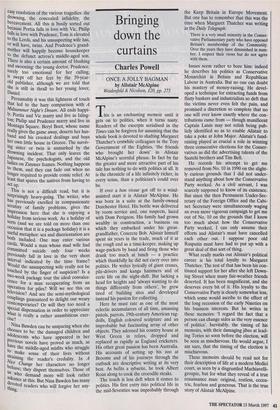Bringing down the curtains
Charles Powell
ONCE A JOLLY BAGMAN by Alistair McAlpine Weidenfeld & Nicolson, £20, pp. 273 his is an enchanting memoir until it gets on to politics, when it turns nasty. Readers of the excerpts serialised in the Times can be forgiven for assuming that the whole book is devoted to shafting Margaret Thatcher's erstwhile colleagues in the Tory Government of the Eighties, 'the friends who brought her down' in Alistair McAlpine's scornful phrase. In fact by far the greater and more attractive part of his tale has nothing to do with politics at all. It is the chronicle of a life infinitely richer, in every sense, than a politician's could ever be.
If ever a bon viveur got off to a wind- assisted start it is Alistair McAlpine. He was born in a suite at the family-owned Dorchester Hotel. His bottle was delivered by room service and, one suspects, laced with Dom Perignon. His family had grown wealthy in construction, a business on which they embarked under his great- grandfather, Concrete Bob. Alistair himself spent six years in the trade, much of it at the rough end as a time-keeper, making up wage-packets by hand and firing those who drank too much at lunch — a practice which thankfully he did not carry over into politics. He writes lyrically of giant cranes, pile-drivers and kanga hammers and of eerie life on the night-shift. But lacking a head for heights and 'always wanting to do things differently from others', he grew tired of building sites and developed instead his passion for collecting. Here he must rate as one of the most eclectic accumulators of all time, amassing pistols, parrots, 19th-century American rag- dolls, English coloured sculpture and an improbable but fascinating array of other objects. They adorned his country house at West Green in relays, dropped and replaced as rapidly as England cricketers. His other great passion has been Australia. His accounts of setting up his zoo at Broome and of his journeys through the outback are descriptive writing at its very best. As befits a sybarite, he took Albert Roux along to cook the crocodile steaks.
The touch is less deft when it comes to politics. His first entry into political life in the mid-Seventies was improbably through the Keep Britain in Europe Movement. But one has to remember that this was the time when Margaret Thatcher was writing in the Daily Telegraph:
There is a very small minority in the Conser- vative Parliamentary party who have opposed Britain's membership of the Community. Over the years they have diminished in num- ber. I respect their views but do not agree with them.
Issues seem rather to bore him: indeed he describes his politics as Conservative Monarchist in Britain and Republican Labour in Australia. But no one can doubt his mastery of money-raising. He devel- oped a technique for extracting funds from flinty bankers and industrialists so deft that the victims never even felt the pain, and promised a discretion so complete that no one will ever know exactly where the con- tributions came from — though munificent Captain Latsis may not relish being pub- licly identified so as to enable Alistair to take a poke at John Major. Alistair's fund- raising played as crucial a role in winning three consecutive elections for the Conser- vatives as did the advertising talents of the Saatchi brothers and Tim Bell.
He records his attempt to get me removed from No. 10 in 1990 on the slight- ly curious grounds that I did not under- stand anything about how the Conservative Party worked. As a civil servant, I was scarcely supposed to know of its existence. But since the then Permanent Under-Sec- retary of the Foreign Office and the Cabi- net Secretary were simultaneously waging an even more vigorous campaign to get me out of No. 10 on the grounds that I knew too much about how the Conservative Party worked, I can only assume their efforts and Alistair's must have cancelled each other out. I suppose poor old Rasputin must have had to put up with a great deal of that sort of thing.
What really marks out Alistair's political career is his total loyalty to Margaret Thatcher. The test of that has been his con- tinued support for her after she left Down- ing Street when many fair-weather friends deserted. It has been magnificent, and she deserves every bit of it. His loyalty to the Conservative Party is clearly somewhat less, which some would ascribe to the effect of the long recession of the early Nineties on his business interests. But he writes in these memoirs: regard the fact that a person can change sides as the very essence of politics'. Inevitably, the timing of his memoirs, with their damaging jibes at lead- ing Tories so soon before the election, will be seen as mischievous. He would argue, I am sure, that the timing of the election is mischievous.
These memoirs should be read not for their description of life at a modern Medici court, as seen by a disgruntled Machiavelli- groupie, but for what they reveal of a true renaissance man: original, restless, eccen- tric, fearless and generous. That is the true story of Alistair McAlpine.


































































 Previous page
Previous page